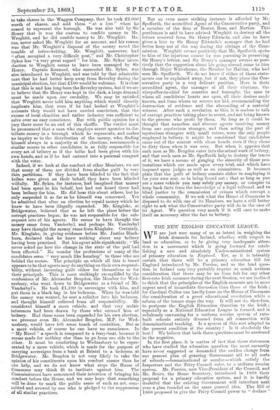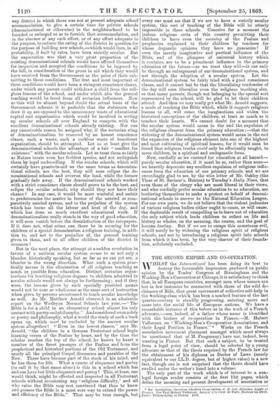THE NEW ENGLISH EDUCATION LEAGUE.
WE are just now many of us so intent in weighing the Irish demands for Ireland, whether with respect to land or education, as to be giving very inadequate atten- tion to a movement which is going forward for estab- lishing a new and absolutely Undenominational system of primary education in England. Yet, as it is tolerably certain that there will be a primary education bill for England introduced by Mr. Forster, and as the land ques- tion in Ireland may very probably require so much anxious consideration that there may be no time left for any other first-rate Irish measure during the next Session, we are inclined to think that the principles of the English measure are in more urgent need of immediate discussion than those of the Irish ; for Cardinal Cullen can hardly force on the House of Commons the consideration of a great educational revolution while a reform of the tenure stops the way. It will not do, therefore, to postpone the English Education Question to the Irish ; especially as a National Education League is formed, and is sedulously canvassing for a uniform secular system of rate- built schools entirely divorced from all connection with denominational teaching. Is a system of this sort adapted to the present condition of the country ? Is it absolutely the best ? We believe that both these questions must be answered in the negative.
In the first place, it is matter of fact that those statesmen who have studied the education question the most earnestly have never suggested or demanded the sudden change from our present plan of granting Government aid to all sorts of schools—denominational or secular—which satisfy the Inspectors and the Privy Council rules, to a uniform secular system. Mr. Forster, now Vice-President of the Council, and Mr. &dee, the Home Secretary, introduced in 1868 their proposal for a primary education system, and it is hardly doubtful that the existing Government will introduce next year a plan founded on the same general idea. The Bill of 1868 proposed to give the Privy Council power to " declare "
any district in which there was not at present adequate school accommodation, to give a certain time for private schools (denominational or otherwise) in the neighbourhood to be founded or enlarged so as to furnish that accommodation, and in the absence of any such effort, or of any effort adequate to the purpose, to enforce the rating of the district in question for the purpose of building new schools,—which would then, in all probability, if built by rates, have been strictly secular. But the expectation was that a very great proportion of the existing denominational schools would have offered themselves for inspection and accepted the conditions to be imposed by the bill, in consideration of the grant in aid which they would have received from the Government as the price of their sub- mitting to those conditions. The first and most important of these conditions would have been a stringent conscience clause, under which any parent could withdraw a child from the reli- gious lessons of the school, and under which also the general teaching would be freed from all sectarian influences. Now as this will be almost beyond doubt the actual basis of the Government scheme, it is probable that the statesmen who drew it up are opposed to the unnecessary waste of educational capital and organization which would be involved in setting up secular schools all over England to compete with the excellent denominational schools already existing. Nor can any conceivable reason be assigned why, if the sectarian sting of denominationalism be removed by an honest conscience clause, such a waste, such a reckless waste of beneficent organization, should be attempted. Let us at least give the denominational schools the advantage of a fair "conflict for existence" with the secular schools. Let us treat them as fairly as Nature treats even her feeblest species, and not extinguish them by legal underselling. If the secular schools, which will certainly have grants-in-aid on the same terms as denomina- tional schools, are the best, they will soon eclipse the de- nominational schools and overrun the •land, while the former gradually fade away. If the denominational schools worked with a strict conscience clause should prove to be the best, and eclipse the secular schools, why should they not have their chance ? In any case, it would be most wasteful and unfair to predetermine the matter in favour of the untried or com- paratively untried system, and to the prejudice of the system which has borne all the labour and heat of the day, and which has done so much excellent educational work. If denominationalism really stands in the way of good education, it will soon vanish before the dissatisfaction of the ratepayers. If it does not, what crime can there be in securing for the children of a special denomination a religious training, in addi- tion to, and not to the prejudice of, the general training given to them, and to all other children of the district in common ?
But in the next place, the attempt at a sudden revolution in favour of a uniform secular system seems to us not only a blunder, historically speaking, but as far as we can yet see, a blunder in the wrong direction. What such a system prac- tically means is the elimination of all religious teaching as much as possible from education. Distinct sectarian organ- izations for teaching religious dogmas to children admitted in secular schools would not always be forthcoming ; and if they were, the lessons given by such specially provided means would not be near as wholesome as the same sort of instruction when given by persons accustomed to teach secular knowledge as well. As Mr. Matthew Arnold observed in an admirable report on the Wesleyan Normal Schools last year,—" The Bible is for a child in an elementary school almost his only contact with poetry and philosophy. " And considered even solely as poetry and philosophy, what a world the study of such a book opens up, which must be excluded by the narrow secular
system altogether ! Even in the lowest classes," says Mr. Arnold, "the children in a German Protestant school begin learning verses of the Psalms by heart, and by the time the scholar reaches the top of the school, he knows by heart a number of the finest passages of the Psalms and from the prophetical and historical portions of the Old Testament, and nearly all the principal Gospel discourses and parables of the New. These have become part of the stock of his mind, and he has them for life. What a course of eloquence and poetry (to call it by that name alone) is this in a school which has and can have but little eloquence and poetry ! This, at least, one would think, might be effected and inspected in all Protestant schools without occasioning any religious difficulty,' and all who value the Bible may rest convinced that thus to know and possess the Bible is a most sure way to extend the power and efficiency of the Bible." That may be true enough, but every one must see that if we are to have a strictly secular system, this sort of teaching of the Bible will be utterly impossible in these schools. Conceive for a moment the jealous religious sects of this country permitting their children to tave even the meaning of the Psalms and prophecies explained to their children by teachers for whose dogmatic opinions they have no guarantee! If even the merely imaginative and poetical influence of the Bible, and of the glimpses of universal history which it contains, are to be a prominent influence in the primary education of the future—as we trust they will—it can only be through an enlargement of our denominational system, and not through the adoption of a secular system. Let the denominational system be fairly tried with a good conscience clause, and it cannot but be that the liberalizing tendencies of the day will soon liberalize even the religious teaching also, so that many parents, though not belonging to the special sect represented by the school, will be glad to let their children attend. And then we may really get what Mr. Arnold suggests, a mode of teaching the Bible which, while it suggests religious lessons to all, will rouse the imaginations and widen the historical conceptions of the children, at least as much as it touches their hearts. We cannot doubt for a moment that the secular system would mean in the end the expulsion of the religious element from the primary education ;—that the widening of the denominational system would mean in the end the expansion of the religious element into one of the highest and most cultivating of spiritual lessons, for it would soon be found that religious truths could only be effectually taught, to mere children, in a spiritual and undogmatic form.
Now, cordially as we contend for education at all hazard— purely secular education, if it must be so, rather than none— we heartily deprecate any needless expulsion of religious influ- ences from the education of our primary schools, and we are exceedingly glad to see, by the wise letter of Mr. Oakley (the Vicar of St. Saviour's, Hoxton) to Tuesday's Daily News, that even those of the clergy who are most liberal in their views, and who cordially prefer secular education to no education, are bestirring themselves to make a protest on behalf of denomi- national schools in answer to the National Education League, For our own parts, we do not believe that the violent jealousies of various religious bodies either ought to cause, or will cause, the deplorable result of compelling us to leave out of education the only subject which leads children to reflect on life and history as wholes, on the meaning, the course, and the goal of human destiny. But if we are to escape this monstrous evil, it will surely be by widening the religious spirit of religious schools, and not by introducing a religious spirit into schools from which it has been, by the very charter of their founda- tion, sedulously excluded.































 Previous page
Previous page